Chess as Brain Exercise : Sharpen Your Mind and Memory
In today’s fast-paced world, finding activities that effectively boost cognitive function and enhance memory is more crucial than ever. One such activity that has stood the test of time and continues to offer significant mental benefits is chess. Often celebrated as a game of kings, chess is not only a captivating pastime but also an exceptional form of brain exercise. Engaging in chess can dramatically sharpen your mind and memory, making it a powerful tool for mental fitness.
Chess as brain exercise involves far more than strategic gameplay; it’s a comprehensive workout for your mental faculties. The game demands acute concentration, problem-solving skills, and strategic planning, all of which contribute to cognitive enhancement.
By regularly participating in chess, players stimulate their brains, leading to improved memory, better problem-solving abilities, and greater cognitive flexibility. Scientific research supports these benefits, highlighting chess as a key player in maintaining and enhancing brain health.
Whether you’re a seasoned chess player or a curious beginner, integrating chess into your routine can offer remarkable cognitive advantages. This article will delve into how chess functions as brain exercise, exploring its impact on memory enhancement, problem-solving skills, cognitive flexibility, and overall mental clarity. Discover how this timeless game can become a cornerstone of your mental wellness strategy, helping you stay sharp and agile in today’s demanding world.
- What is chess as brain exercise?Chess as brain exercise refers to using the game of chess to stimulate and enhance cognitive functions such as memory, problem-solving skills, and concentration.
- How does playing chess improve memory?Playing chess improves memory by requiring players to remember patterns, positions, and strategies, which enhances both short-term and long-term memory.
- How does chess affect concentration and focus?Chess enhances concentration and focus by requiring players to remain attentive and engaged throughout the game, leading to improved mental stamina.
- Are there any age restrictions for benefiting from chess as brain exercise?No, chess benefits individuals of all ages. It offers cognitive stimulation and mental challenge that are valuable at any stage of life.
The Cognitive Demands of Chess
Chess can be considered to be one of the most complex cognitive requirement games in the world, wherein the player would engage in highly complex mental processes in order to play the game. Each move that is played out on the chessboard has an associated multi-layered thought process; the players need to view the current position of the board, guess or calculate what probable moves their opponent may carry out, and think a couple of moves ahead. In this constant need for strategic foresight, various cognitive functions are engaged: spatial reasoning, critical thinking, and problem-solving skills.
This game is a real mental exercise in the sense that it challenges a player to trace multiple variables at any one time and change strategies accordingly when the state of the game evolves.
Improved concentrative and focusing abilities are also fostered by the cognitive demands required during chess playing. Focused attention by each player during the chess game, considering every move’s implications and potential consequences, fosters avoidance of distractions and improvement in mental clarity.
Additionally, chess requires one to remember complex patterns and historical scenarios of the game, thus strengthening memory and recall. The combination of strategic planning, deep concentration, and memory capacity makes chess very instrumental in cognitive development and the creation of mental agility.
Memory Enhancement
Probably the most important cognitive advantage that can be derived from playing chess pertains to memory enhancement. That is, a chess player has to remember the exact position of his pieces on the board, memorize the games played earlier, and try to think several moves ahead. The former requires an extremely high level of working memory, which is the ability to hold and manipulate information in your mind over short periods.
This is supported by various studies that have proved chess players usually have better memory than non-players. The process of remembering the patterns, strategies, and sequences in chess transcends into better retention of memory in everyday life. From remembering important dates, tasks, or pieces of information, the enhancement of memory due to chess is deep and wide-ranging.
Problem-Solving Skills
The “mental gymnasium” is a common label attached to chess and indeed literally describes the sort of workout it will give your problem-solving skills. The game allows each player to come up with problems in every game, and these have to be solved in a creative manner.
A player needs to look at the board, realize and assess threats that are approaching, and devise strategies for surmounting them. After all, this continuous exercise in problem-solving actually strengthens the neural pathways of the brain, providing an easier way through complex issues in life.
The problematic state of chess enriches logical thinking and decision-making. It teaches a player how to weigh in on the advantages and disadvantages that come with each move, predict the results, and come up with a viable decision. This sort of ability can be transferred to real life to ensure that one is better placed at making correct decisions and formulating effective solutions to problems.
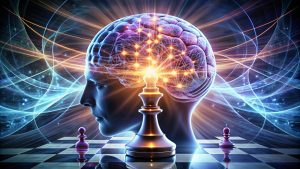
Cognitive Flexibility
Cognitive flexibility is the level of adjustment of the brain to new situations and the ability to generate many unique solutions. During a chess game, players have to change strategies as fast as possible in reaction to opponents’ moves, which is by means of cognitive flexibility since it involves shifting among different mental tasks such as analysis, planning, and execution.
Playing chess regularly has been shown to increase cognitive flexibility. This mental flexibility—a skill that is invaluable from dealing with life’s curveballs to brainstorming at the office—is built through daily chess play. This game keeps training the mind to be flexible and open to different situations.
Concentration and Focus
Playing chess requires a great deal of concentration and focus. For every move to be made, a lot of thought has to go into it, and even a second’s worth of lack of attention means an oversight that may prove dear. Indeed, it is this requirement of the game that trains the brain to focus for a sustained period.
Better focus is transferred not only to chess but to everyday life. Studying, working, or doing anything that requires a certain level of mental effort enriches your ability to focus deeper and perform better. Chess helps to develop this key skill that can result in avoidance of distractions and better focus.
Strategic Thinking
Chess is strategic in nature, and, in order to win, players must be strategic as well, thinking many moves ahead. Strategic thinking includes thinking through to long-range outcomes, preplanning for any problems that situation may hold, even framing fallback plans in the case of a miss. The skill developed through strategic thinking is transferable to real-life situations, personal and professional.
Well, the more you play chess, the more you train your strategic thinking, abilities which will eventually help you in setting and attaining goals. Be it a change of career, managing a project, or even treading your way through a tricky situation, skills at strategic thinking in chess will give you a tremendous edge.
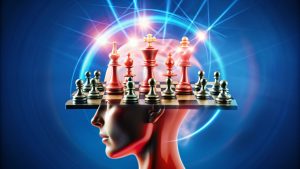
The Science Behind Chess as Brain Exercise
The science of chess as a mental exercise reveals a deeper impact it has on the cognitive functions and the health of the brain. Evidence has been found for the fact that playing chess arouses neuroplasticity—the brain’s ability to reorganize and form new neural connections when it faces mental challenges. Playing chess regularly will increase gray matter density in the brain, especially in the areas associated with problem-solving, memory, and spatial reasoning. This increase in the volume of some regions of the brain exemplifies how this game can invigorate cognitive growth and adaptability.
Brain-imaging research studies have more tangibly shown the effect of chess on brain function. For example, using MRI, scientists have discovered that chess players often increase gray matter volume in regions responsible for executive functions like planning, decision-making, and strategic thinking.
Accompanying such structural change is functional improvement; this includes enhancement in the degree of cognitive control and problem-solving ability. The scientific evidence is pretty loud in its declaration that chess is a full-scale exercise of the brain, providing long-term mental health and cognitive resilience due to its complex and demanding nature.
Neuroplasticity
Neuroplasticity refers to the extraordinary ability of the brain to reorganize and change structure and function with respect to experiences, learning processes, and environmental changes. This dynamic process comprises the growth of new neural connections and the respective strengthening or weakening of existing ones. Neuroplasticity contributes to cognitive development, recovery from brain damage, and mental flexibility more generally. The more a person engages in brain-stimulating activity—like playing chess—the higher the degree of neuroplasticity, and thus, their memory, problem-solving abilities, and strategic thinking greatly improve.
Involvement in difficult mental activity, such as that involved in chess, furthers neuroplasticity by pushing the brain to generate and strengthen new pathways. When playing chess, one has continuously exercised one’s brain and, therefore, created new links between neurons, thus enhancing its efficiency. It has been shown that continuous challenge from intellectually relevant activities might lead to increased gray matter density in the brain, an indicator of positive cognitive health. In demonstrating this capacity to change, it encapsulates how flexible the brain really is and therefore how activities like chess playing are incorporated to promote long-term mental health and cognitive enrichment.
Chess and the Aging Brain
However, there will always be cognitive deterioration if this does happen. Nevertheless, it somehow decelerates through playing games that activate the brain. In fact, studies have shown that the consistent playing of chess by older adults can prevent the onset of dementia and cognitive impairments.
It provides a mental workout to keep the brain alert and participating. Since, on a regular basis, the brain is being challenged with tasks of great complexity, the ability of chess players to preserve cognitive function and memory is easily recognizable even in old age. As such, chess exercises the brain and is an excellent exercise for seniors looking to stay sharp and maintain great mental health over the years.
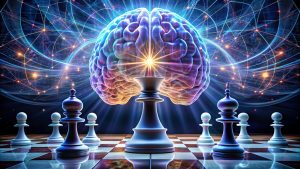
Conclusion
Chess isn’t just a game; it’s a powerful brain exercise that can transform the way you think and remember. Engaging deeply with chess goes beyond mere piece movement; it’s about enhancing your memory, sharpening your problem-solving abilities, and training your brain to think flexibly and strategically. Whether you’re aiming to stay mentally sharp as you age, boost your cognitive skills, or simply find a mentally stimulating hobby, chess offers unparalleled benefits.
Envision a daily routine where your mind is consistently challenged, your focus is heightened, and your strategic thinking is refined. This is the power of chess as a brain exercise. The benefits are profound and scientifically supported, making chess not just a pastime but a lifelong tool for mental agility and clarity. Embrace chess, and let it become your ultimate exercise for a sharper, more resilient mind.
Pressed for time or prefer listening? You can listen to the podcast version of this article instead! Just click below to hear the content narrated for your convenience :
References:
- Sala, P., Gobet, F., Trinchero, R., & Ventura, M. (2017). “Cognitive Benefits of Chess Training in School-Aged Children: A Randomized Controlled Trial.” Educational Psychology, 37(6), 693-711.
- Burgoyne, A. P., Campbell, M. J., Sala, P., Gobet, F., & Macnamara, B. N. (2020). “The relationship between chess and cognitive skills: A systematic review.” Perspectives on Psychological Science, 15(5), 1031-1051.
- Sala, P., Gobet, F., & Trinchero, R. (2019). “The effect of chess instruction on the cognitive skills of students: A meta-analysis.” Educational Research Review, 26, 100-112.
- Gajda, A., & Biedrzycki, J. (2019). “Chess and cognitive skills: A longitudinal study of the impact of chess on academic achievement.” Intellectual and Developmental Disabilities, 57(3), 200-209.
- Burgoyne, A. P., Campbell, M. J., Sala, P., Gobet, F., & Macnamara, B. N. (2021). “Do chess skills correlate with cognitive abilities? A review of the evidence.” Cognitive Science, 45(3), e12929.
- Verghese, J., Mahoney, J. R., Ambrose, A. F., et al. (2010). “Walking improves cognitive function in older adults.” Journal of Geriatric Physical Therapy, 33(2), 80-86.
- Dumas, F. (2014). “Cognitive and neural impacts of chess training on children: A review.” Journal of Cognitive Enhancement, 1(4), 433-440.
- Hsu, C. C., & Hsieh, Y. L. (2016). “The role of cognitive flexibility in chess performance.” Journal of Educational Psychology, 108(3), 419-431.

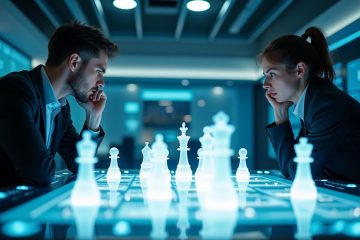
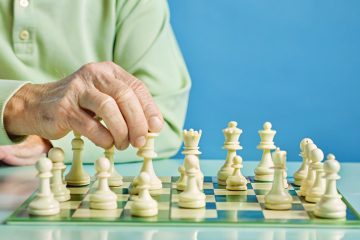
0 Comments